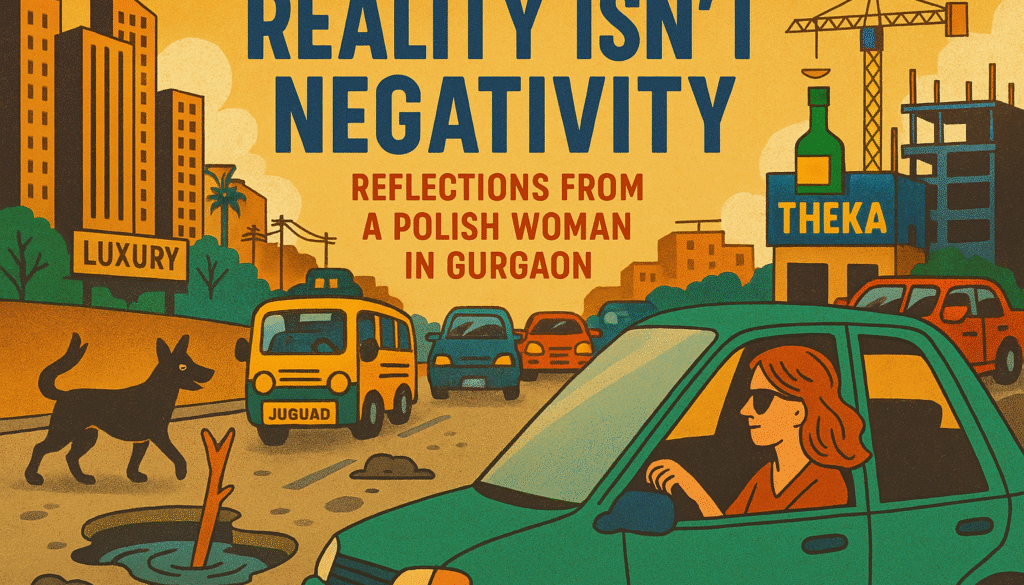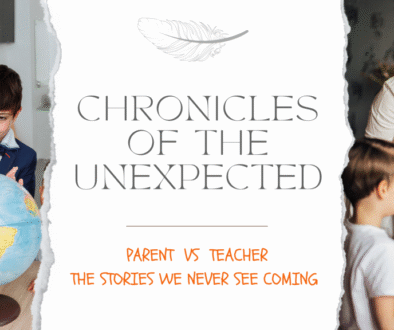
Reality isn't Negativity
Every time I speak about what’s not working in the city, someone is ready with a quick label: “You’re being too negative.” Really? Since when did speaking the truth become a crime? I see a problem and I name it. That doesn’t mean I don’t see beauty, goodness, or progress. In fact, I make sure every single day to notice what’s positive around me—there’s plenty! But sugarcoating everything in the name of “positivity” is not my style. If I say I’m not okay, it means I respect myself enough not to lie about it. And if I say a city—this so-called “millennium city”—has serious issues, it’s because I believe we can do better.
Let’s start with civic sense. Or the lack of it.
Why is standing in line such a big deal? Why is waiting for your turn such a challenge? Population? Please. Look at Japan. It’s not about how many people. It’s about how people behave. Queues, crossings, common sense—it’s not rocket science. Yet here, it’s often a turmoil of honking, pushing, and cutting lines, because everyone’s in a bigger rush than the next.
Let’s talk roads. Or what’s left of them. Holes, potholes, broken patches—often with a stick poking out of them, generously placed by a kind soul to warn the next victim. Repairs are done the “jugaad” way—temporary fixes meant to last until someone gets seriously hurt. There’s no safety around construction sites, no warning signs. You turn into a street, and oops—blocked. Go back. Where’s the regulation? Why do we wait for damage before we do something? Why is patchwork more common than planning?
Drainage? Don’t even get me started. Every monsoon we need boats. The stench, the mess—how is this normal in a city full of billion-dollar homes?
Speaking of which, people live in Aralias, Camellias, million-rupee condos with designer dogs and infinity pools, but guess what? There’s no zebra crossing in front of their buildings. Workers, nannies, security guards—they have to dodge traffic just to cross the road. Who planned this city? For whom?
And don’t tell me it’s all the British fault. It’s 2025. You have your independence, your brains, your money. Use them. Build something better. Stop blaming the past when you have power in the present.
Now let’s talk about driving.
I used to roll my eyes when men made those casual, sexist comments about women drivers. “Oh please,” I’d say. “Have you seen Gurgaon women?” These women drive like pros! I’ve been driving here since the early 2000s—back when there were no signals, no streetlights, just “honk honk” from every direction and hope for the best. I zoom through the city like a pro, and many other women do too. They’ve mastered this chaos.
But let’s be real—some of us have also turned into bulls. Eyes shut, we move from point A to B like we’re queens of England. No indicators, no mirrors, no rules. Push, switch, squeeze—zero awareness. And God forbid someone points it out! The defense mode activates. “How dare you question me? I’m a woman!” No ma’am, that’s not feminism. That’s just bad behavior with an ego problem.
Apologizing is a lost art. No one admits fault. No one says sorry and means it. Why? Because shouting louder might just make the other person back off. “Let me scare them before they question me.” Power games. Ego trips.
Speaking of power trips, have you noticed the way people behave in public?
There’s so much energy in this city—and not the friendly kind. One small disagreement, and boom! Shouting, insults, drama. Especially if the attacker sees that the other person is “lower” in some social rank—just one golden chance to feel “bigger,” to show “I can.” It’s exhausting.
And women, too, have started mimicking this aggression. I miss the days when we spoke with grace. There was charm in our dignity, beauty in composure. Now, it’s like a full-on boxing match with lip gloss. Screaming on streets, throwing insults—it’s not empowerment. It’s chaos. Strength doesn’t have to be loud. Politeness isn’t weakness.
Now let me touch a delicate one: urinating in public.
Yes, it’s improved. But I can still spot them—those proud “pissing kings” on the roadside. Zippers down, dingdong out, no shame in sight . And the spitting! Oh my god, the spitting. The deep, dramatic throat-clearing followed by a projectile launch—it’s like a national sport. Why? Why must the entire world hear and see your internal cleansing?
Burping, farting—yes yes, “natural” and even “healthy.” But for heaven’s sake, keep it personal. Not every tradition needs to be worn like a badge. We’re in a city that claims to be global. Some things can stay within your digestive system, thank you very much. You can do all your puff and gaff at home, as much as you want—we all do. Just don’t parade it proudly in public like it’s some cultural trophy. In many parts of the world, it’s just considered… gross.
And what about animals?
Why are we still pretending street dogs don’t exist until they bite someone? Where is the government body responsible for controlling birth, safety, and health of strays? And cows crossing the roads—why the rush when you see an animal? You worship them but don’t stop for them? High-level hypocrisy deserves a whole research paper. People throw garbage from their car windows, treat the earth like a dustbin, and yet do pooja the next morning. Please explain.
And the environment? Just go see Leopard Trail. Once a haven of peace, now a party zone. Loud music, cars, trash. Why do people need to bring chaos everywhere they go? Can’t some places stay sacred, even without temples?
Let’s pause for a moment and acknowledge: yes, Gurgaon can be beautiful. Some buildings, restaurants, cultural spaces—it’s like entering a different country. You feel like you’re in a museum, or a scene from a beautiful European theatre. The design, the detail, the ambience—it’s stunning.
But just wait… every few meters, what do you see? Thekas. Alcohol shops. Glorious, glowing, better lit than hospitals. They sparkle like temples of the holy grail. Designed like ashrams of intoxication. No garbage rules apply here. These temples of buzz are built right on the main roads—why? Easy access, of course. Traffic? Who cares! I must stop and sip. I’m the boss. That’s the energy.
And schools? Also on the main roads. No drop-off zones. No safety channels for kids. Rush hour chaos, angry drivers, children squeezed in between bumpers—and we wonder why they grow up to repeat the same madness? No planning. No underground parking. Even teachers struggle to find parking, starting their day already stressed, praying their car isn’t damaged while they’re nurturing the future of this country.
And while we’re being honest—can we also talk about accessibility?
Where are the ramps, the tactile paths, the thoughtful designs that include everyone? Ever tried pushing a stroller on a footpath here? Oh wait—what footpath? It’s all broken tiles, dumped debris, or cars parked like it’s their private driveway. And don’t even mention wheelchairs. If you’re not on two feet with ninja reflexes, good luck surviving the urban jungle. We talk about inclusion in fancy conferences, but forget the basics outside our doors. Accessibility isn’t charity—it’s dignity.
Why does this happen? Why is planning not futuristic, inclusive, or thoughtful? Why is everything profit over people?
And my last question—if Gurgaon is getting so choked, will the new cities learn from it? Or will we build the next chaos center just a few kilometers further, repeat all mistakes, and blame the same old things?
It’s like people behave like a virus. Wherever they go, they destroy, consume, damage. Where is the respect—for space, for systems, for each other?
Yes, there are good people. Kindness exists. There are those who feed animals, help strangers, keep their spaces clean. I see them, I honor them. But when their goodness is drowned by the noise of ignorance, what’s the use? You’re free now. Use that freedom to create beauty, not just profit. To respect space, time, each other.
This isn’t negativity. This is a love letter with bold highlights. I speak because I care. I name things because I hope for change. And if that makes me “too honest,” well… I’d rather be real than silent.

